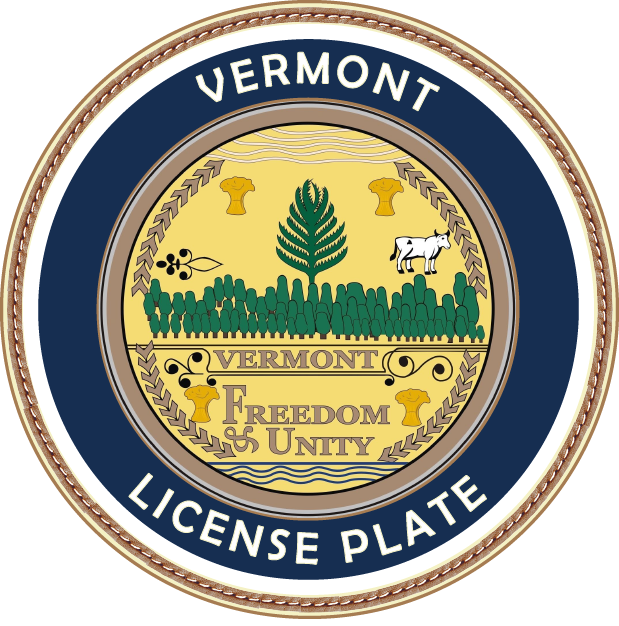Vermont License Plates FAQ
How do I register a vehicle in Vermont?
To register a vehicle, complete Form VD-119 and submit it with the title or bill of sale, proof of insurance, identification, and payment for fees. Applications may be submitted in person or by mail to the Vermont Department of Motor Vehicles. Once approved, you will receive license plates, a registration certificate, and a validation sticker.
Can non-residents register a vehicle in Vermont?
Yes. Vermont allows non-residents to register vehicles, including custom and antique cars. However, drivers must verify if their home state recognizes Vermont registration for ongoing use.
How do I renew my registration?
Registrations can be renewed online, by mail, or at a DMV office. You will need your renewal notice, vehicle information, proof of insurance, and payment. Late renewals may incur penalties. A one- or two-year renewal option may be available, depending on vehicle type.
What documents are needed to register a vehicle?
You must provide:
- Completed Form VD-119
- Proof of ownership (e.g., title, bill of sale)
- Valid identification
- Proof of Vermont auto insurance
- Odometer disclosure (if required)
- Applicable fees
Can I personalize my license plate?
Yes. Vermont offers personalized plates for most vehicles. You may request a custom combination of up to 7 characters, subject to availability and approval. A separate application and additional fee apply.
Are front license plates required in Vermont?
Yes. Most vehicles in Vermont must display both front and rear license plates. Exceptions include motorcycles and trailers, which require only one rear plate. Failure to comply may result in fines.
Can I transfer my license plates to another vehicle?
No. Vermont does not allow plate transfers between vehicles. Plates are issued to the specific vehicle and must stay with it when sold or traded.
What if my license plates are lost or stolen?
Report the loss to local law enforcement and obtain a police report. Then, submit Form VD-036 to the DMV along with the required replacement fee. Temporary plates may be issued during processing.
What should I do if I move out of Vermont?
Return your Vermont plates to the DMV and cancel your registration to avoid future tax and insurance obligations. Include a brief note explaining the reason for return. Mail plates to:
Vermont DMV – Plate Return
120 State Street
Montpelier, VT 05603What license plate options are available?
Vermont offers:
- Standard green-on-white plates
- Personalized plates
- Veteran and military service plates
- Environmental, collegiate, and organizational plates
- Antique and custom vehicle plates
Each type may have eligibility requirements and associated fees.
How long does registration processing take?
Standard processing time is approximately 10 to 15 business days for mailed applications. In-person submissions may be processed on the same day. Delays may occur if documents are incomplete or require verification.
Can I register a vehicle without a title?
Vermont requires a title for vehicles newer than 15 years. For older vehicles, a bill of sale and a VIN verification may suffice. Always check current requirements on the DMV website.
Is emissions testing required for registration?
Vermont does not require emissions testing for registration. However, annual vehicle inspections are required for safety. These must be conducted by certified Vermont inspection stations.
What fees are involved in registration and plates?
As of 2025, standard fees include:
- 1-year passenger vehicle registration: $76
- 2-year registration: $140
- Personalized plate fee: $48 (initial and renewal)
- Replacement plate fee: $12–$20
A full fee schedule is available on the DMV website.
What if I never receive my plates or registration stickers?
If you do not receive your plates or stickers within 15 business days, contact the DMV. You may be required to complete a lost-in-mail form. Replacements are typically issued free of charge if the delay is not due to applicant error.
